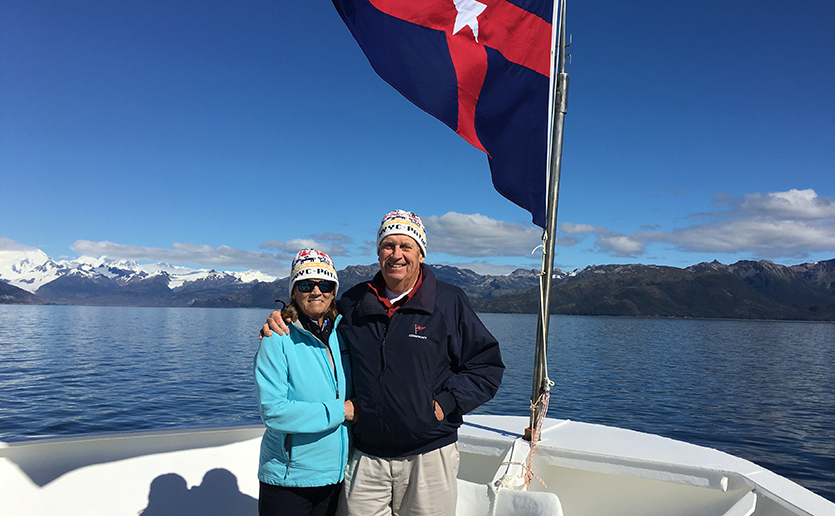Accustomed to navigating oceans in yacht races like the famed America’s Cup, David Elwell knows what it’s like to face an enormous challenge. That’s why, having outpaced cancer, he’s become an enthusiastic supporter of the Center for Innovation in Early Cancer Detection at the Massachusetts General Hospital Cancer Center.

“I consider myself outrageously lucky,” he says. “By serendipity, they found my lung cancer early because of an X-ray taken for another procedure.”
Never a smoker, Mr. Elwell says the diagnosis was a complete surprise. “My only comfort,” he says, “was that it was found at an early stage when lung cancer is much more survivable.”
He and his wife, Christy, spend summers in Newport, Rhode Island, and winters in Florida. After a nodule on his lung showed on an X-ray taken in Florida three years ago, they headed to Boston to Mass General the next day.
“If either Christy or I have health issues, we come to the best facility,” Mr. Elwell says.
Not Leaving Detection to Chance
To navigate the cancer world, he drew upon lessons from his yachting experience. “To be a competitive sailor or any athlete, there’s a discipline it takes to be good,” says Mr. Elwell, a former commodore of the New York Yacht Club. Three times, he competed in arduous transatlantic races. “I’ve been similarly disciplined about my health and no longer take it for granted,” he says.
Stories like Mr. Elwell’s are a motivation for Lecia Sequist, MD, MPH, director of the Center for Innovation in Early Cancer Detection. Sometimes cancer is found early serendipitously when a patient undergoes a test for something else. But often it is not discovered until the cancer is advanced and more difficult to treat. “We don’t want early cancer detection to rely on chance,” she says. “That’s the whole philosophy behind our center’s efforts.”
Building on Bold Breakthroughs
Building on bold breakthroughs at Mass General, she and other Mass General researchers are seeking ways to detect cancer-related cells and DNA circulating in the bloodstream before they take hold. They are using urine and even breath to find early traces of cancer. Dr. Sequist, for example, is investigating technologies to identify compounds in exhaled breath for early signs of lung cancer.

• On the Hunt for Early Cancers
• Ovarian Cancer: Racing to Stop a “Silent” Killer
• Donors Help Launch Early Cancer Detection Center
“To find additional early screening methods could make a huge difference in survival outcomes for patients,” Dr. Sequist says.
Funding Early Cancer Detection
The Elwells and other donors have enabled the center to offer pilot funding this year to eight researchers with new ideas to explore. One funded project is looking for molecular signatures of circulating tumor cells to detect aggressive prostate cancer. Another is seeking a certain cell circulating in blood that could help detect liver cancer. Other projects await funding to get launched.
“It is stunning to hear about the whole host of things they are trying to do to detect cancer earlier,” Mr. Elwell says.
Mr. Elwell and his wife are enjoying life these days. They play a lot of golf and went on an expedition to Patagonia last winter. He’s sailing again, though not competitively.
“Seldom a day goes by when I don’t think about my cancer experiences,” he says. By supporting the center’s research, “I want others to be as fortunate as I consider myself.”
For more information about supporting the Center for Innovation in Early Cancer Detection, please contact us.

